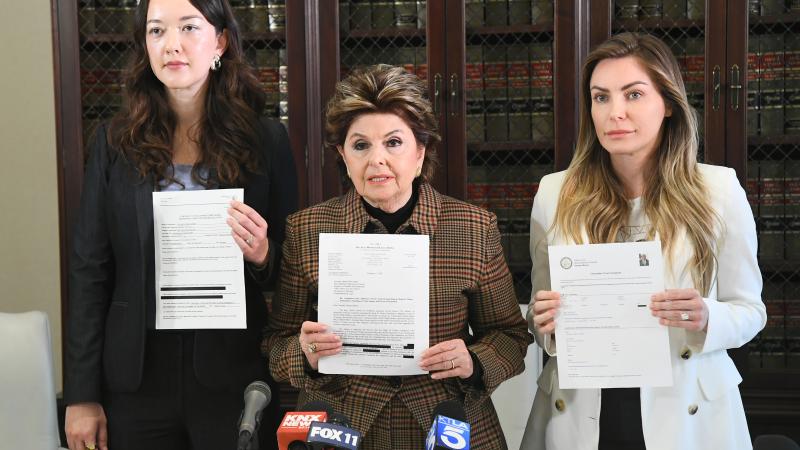Bureau of Prisons' guidance shows scope of taxpayer-funded transgender care, medical procedures
The Federal Bureau of Prisons June 2023 guidance provides a revised roadmap for treatments of transgender inmates, including hormone therapy and complicated surgeries.
The Biden Administration agency responsible for all federal prisons introduced a revised policy for inmates that identify as transgender that includes guidance for taxpayer funded gender transition surgeries and cosmetic adjustments.
On Monday, the Heritage Foundation's Oversight Project released the guidance which it obtained from the Federal Bureau of Prisons (FBOP). The document obtained by the project was promulgated by the agency in June of this year to update its guidance on prisoners who identify as transgender incarcerated in the federal prison system.
According to the document, this revised guidance included new sections on “preventative health screening, non-invasive or invasive surgical procedures and transitions of care.” This includes guidance and policies on hormone therapies, invasive surgical procedures, and purely cosmetic adjustments, such as permanent hair removal.
You can read the document below:
“Prisoners go to jail because they commit crimes and owe a debt to society. Society doesn’t owe them taxpayer funded sex changes and things as absurd as facial hair removal treatments,” Heritage Foundation Oversight Project Director Mike Howell told Just the News on Wednesday.
“We have been investigating this disturbing prison-to-trans pipeline and have also discovered that transgender prisoners account for a disproportionately high amount of sex crimes. It’s truly revolting what the Biden Administration signed us all up to fund,” Howell continued.
The Oversight Project is an arm of the Heritage Foundation dedicated to making government more transparent and facilitate the oversight capacity of Congress through its research and investigations, according to the group’s webpage.
The treatment policies outlined in the newly surfaced document range from complex and invasive “gender affirming” surgeries to cosmetic adjustments like hair removal and speech therapy to change the inmate’s voice.
The guidance concludes that “Gender confirming surgery may be medically necessary and is considered on a case-by-case basis” primarily to resolve or alleviate gender dysphoria or incongruence in some inmates, though the guidance cites no clinical research here to back up this claim. The inmate also does not have to be diagnosed with gender dysphoria, but only have to confirm a “gender incongruence,” in order to begin hormone treatment, according to the guidance.
Among the complicated procedures highlighted by the guidance are breast augmentation surgeries, removal of sex organs, construction of new sex organs from body tissue, and even the use of a prosthetic device to mimic a naturally occurring erection.
You can view Table 5 from the guidance below, which lists the surgical interventions:

Eligibility for these invasive treatments are determined by the Transgender Utilization Review Advisory Group established by the federal prison system to complete a medical review and examination of the inmate. The advisory group is made up of a pharmacist, psychiatrist, a primary care physician and a social worker and together determine whether an inmate should undergo transition.
Before an inmate/patient can obtain transition surgeries, however, he or she has to proceed according to the designated transition pathway, which the guidance summarizes in Appendix 1. After an assessment by a mental health professional, the inmate may undergo hormone therapy and live as their “identified gender” for at least 12 months.
The guidance highlights the risk factors of hormone treatments, which the attached consent forms provide for the prospective patient. For both estrogen and testosterone hormone treatments, the consent form requires the prospective transitioner to acknowledge that “the side effects and safety of these medicines are not completely known” and that “There may be long-term risks that are not yet known.”
The FBOP website says that staff provide “essential medical, dental, and mental health (psychiatric) services in a manner consistent with accepted community standards for a correctional environment.”
The FBOP told Just the News on Wednesday Transgender Executive Council receives all requests for gender-affirming surgery and, if approved, forwards the case to a medical doctor, who will determine if the surgery should proceed. All inmates in custody are also counseled on the risks and long-term effects of hormone therapy, according to the FBOP.
The FBOP also addressed the funding of care. “Concerning the funding of care, ordinarily, FBOP funds are utilized to provide medically necessary care for individuals committed to our care and custody,” the FBOP told Just the News on Wednesday. The BOP’s conclusion that “gender confirming surgery may be medically necessary” indicates that these services are provided through its funds for the medical care of prisoners.
The FBOP did not answer a question from Just the News asking what research the bureau cites to determine that gender confirming surgeries may be medically necessary.
The guidance also gives prisoners the right to request a transfer to a “gender affirming” institution to live as their desired gender with the approval of the warden. This can present a variety of problems for prison management and could potentially lead to dangerous conditions for other prisoners, the Oversight Project said.
The Oversight Project uncovered data in August from the Wisconsin Department of Corrections that showed that more than half (50.3%) of “transgender women”—or male to female transitioners—incarcerated in the Wisconsin prison system have been convicted of at least one count of sexual assault. The crimes the Wisconsin corrections department said constitute sexual assault range from sexual exploitation of a child to lewd and lascivious conduct.
However, none of the transgender individuals were charged with either sexual assault or abuse while serving their prison sentences, according to the data.
You can read the document obtained by the Oversight Project here:
Transgender advocacy groups claim that transgender identifying prisoners are actually more likely to be victims of sexual assault and discrimination compared to the normal prison population. Data collected by the Justice Department in 2015 found that 35% of transgender identifying inmates reported “experiencing one or more incidents of sexual victimization by another inmate or facility staff.”
When President Biden took office he reinstated an Obama Administration policy that requires prisons to consider transgender inmate safety when deciding where they will be housed in order to counter the threats this transgender identifying individuals experience. This reversed the Trump Administration policy of holding transgender individuals according to their birth sex.
On the other hand, the Washington Free Beacon reported in January that biologically female prisoners in the California detention system have been sexually assaulted and abused by male prisoners claiming to be transgender women. This comes as the transgender population in California prisons has grown by over 1200% from 2014 to 2021, according to the Free Beacon. The National Center for Transgender Equality, a transsexual advocacy group, asserts that transgender inmates are ten times more likely than the general prison population to be targeted for violence.
Many of the open safety questions surrounding transgender identifying inmates remain unanswered.
The FBOP’s revised policies come in the wake of a major 2020 lawsuit against the prison system by Peter “Donna” Langan, an inmate who filed a lawsuit after being denied gender transition surgery. Langan is serving a life term in prison for robbing two banks and other connected charges. He was part of a neo-Nazi group called the Aryan Republican Army and intended to use stolen funds from the bank robberies to fund the group.
Because of the lawsuit, the FBOP moved quickly to provide Langan the transgender surgeries he had requested according to federal filings reviewed by The New York Post. Langan received his surgical procedures in late 2022 funded by taxpayer money, the first federal prisoner to do so.
The Biden Administration’s new policies indicate that Langan won’t be the last federal prisoner to receive transgender surgical care.
The Facts Inside Our Reporter's Notebook
Documents
Links
- Oversight Project released the guidance
- the groupâs webpage
- gender dysphoria
- BOP website says
- uncovered data in August
- advocacy groups claim
- Data collected by the Justice Department in 2015
- reinstated an Obama Administration policy
- reported in January
- sued after being denied a gender transition surgery
- reviewed by the New York Post
- first federal prisoner
Other Media

















